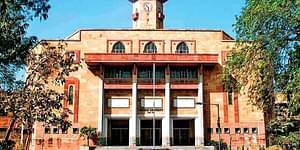BSc Geography
BSc Geography Overview
BSc Geography is a three-year undergraduate degree with a focus on Geography. BSc Geography is a bachelor's degree in geography. It is the study of the Earth and its many properties, characteristics, people, and phenomena, as well as the interpretation of maps and geographical images. Geography is a combination of social and physical sciences that focuses on the physical properties of the planet while also studying societies and how they interact. Physical geography, which includes the climate, atmosphere, ecosystems, and natural processes of the Earth such as tectonic plates, glaciers, erosion, and volcanology, is the focus of the BSc Geography course. It broadens students' understanding of human geography, economic geography, physical geography, maps, and scales.
It includes field trips and fieldwork to immerse students in local environments so that classroom lessons can be implemented. River topics, ecology, environmental engineering, physical environment, climate change policy, modern city building, political geography and geopolitics, economic geography, coastal and marine ecosystems, environmental hazards, and energy resources are some of the modules that may be covered. The BSc Geography course can be taken full-time or part-time via correspondence. It is the scientific study of the Earth and its features, inhabitants, lands, and phenomena. The BSc Geography syllabus is divided into six semesters. The literal translation is "to describe or write about the earth." It is career-oriented in nature and will provide candidates with numerous BSc Geography job opportunities upon completion. The BSc Geography course covers historical eras in geographical research such as analyses of natural and human phenomena, area studies, man-land studies, and earth science research.
As per BSc Geography eligibility criteria, candidates who have completed their Higher Secondary School Certificate 10+2 with a minimum aggregate of 50% marks in Science or Arts are eligible to apply for a BSc Geography degree. BSc Geography admissions are typically granted based on the candidate's performance in the previous examination. Some universities/colleges, such as BHU, may require candidates to take a BSc Geography entrance exam.
The BSc Geography course fee varies depending on the university, ranging from INR 5,000 to INR 5,000,000. In general, geography is regarded as a science that seeks to explain the world around us and the effects of natural and man-made factors and events. The BSc Geography course is a branch of Earth Sciences that focuses on physical geography. Physical geography is the study of the Earth's seasons, climate, atmosphere, soil, streams, landforms, and oceans.
Candidates who complete the course can work as Urban Planners, GIS Specialists, Cartographers, Environmental Management, Climatologists, and other positions. Planetariums, local governments, universities, and private companies are among the top BSc Geography recruiters.
The average BSc Geography salary (annually) ranges from INR 2,00,000 - INR 8,00,000 and increases with experience and skill set. If candidates wish to continue their education after completing this course, they can pursue an MSc Geography degree after successfully completing the BSc Geography course.
BSc Geography Course Highlight
The course highlights of the BSc Geography Course are given below.
Course Level |
Undergraduate |
|---|---|
|
Course Duration |
3 years |
|
Examination Type |
Semester-Wise |
|
Eligibility Criteria |
Class 12th Board exams with 50% aggregate mark in science stream. |
|
Admission Process |
Based on:
|
|
Average Course Fee |
INR 5,000 – INR 5,00,000 |
|
Average Annual Salary |
INR 2,00,000 – INR 8,00,000 |
|
Top Recruiting Areas |
Planetariums, Local Government, Universities, Private Companies, the Armed Forces, Environmental Protection Agencies, Environmental Consultancies, Charities, Education Authorities, Information Systems Organizations, etc. |
|
Job Positions |
Urban Planner, GIS Specialist, Cartographer, Environmental Management, Climatologist, Demographer, Writer or Researcher, Geo Analyst Trainee, National Park Service Ranger, Geography Teacher, and so on. |
When to do a BSc Geography Course?
BSc Geography degree programmes are typically completed after high school. Students in the Science stream select the BSc Geography course as their graduation course to gain a more in-depth understanding of the BSc Geography subjects in the category. Students interested in pursuing more technical qualifications must take various entrance exams, whereas those interested in improving their research skills should pursue a BSc Geography degree. River topics, ecology, environmental engineering, physical environment, climate change policy, modern city building, political geography and geopolitics, economic geography, coastal and marine ecosystems, environmental hazards, and energy resources, among others, are typical BSc Geography subject lists.
Who should take the BSc Geography Course?
As per BSc Geography eligibility criteria, candidates must have passed their 12th-grade board exams with at least 50% or an equivalent CGPA and PCM as their major subject combination from a recognised board to be eligible to pursue a BSc Geography course.
The following are the additional requirements for applying to the BSc Geography degree:
- The BSc Geography course is highly recommended for candidates with a scientific interest and background.
- This BSc Geography course will benefit students interested in careers in multi- and interdisciplinary science fields.
- Candidates with a BSc Geography degree who pursue specialisations in various fields can also expect to earn high-paying salaries.
BSc Geography course is also an option for candidates who meet the following requirements:
- Applicants must be able to communicate clearly and concisely in both verbal and written form, have a strong curiosity about their surroundings, be creative in problem-solving, and have a solid understanding of the scientific method and research.
- Candidates must be detail-oriented, have good interpersonal skills, and have the mental stamina to work long hours.
- They must also be able to work in the field because the majority of their work is done outside laboratories.
- Computer skills, as well as an open mind to new discoveries in geographical science, are also required for participation in these scientific studies.
Why choose a BSc Geography Course?
A BSc Geography degree prepares a candidate to make a difference in the world, whether by assisting in the prevention of climate change and natural disasters or by improving the quality of life and reducing overpopulation. BSc Geography is considered to be one of the most detailed subject areas. It has one of the highest levels of employability in the current scenario.
This BSc Geography course will teach you a variety of transferable skills such as problem-solving, critical thinking, data processing, analytical programming, and teamwork. The degree programme is designed to give students a clear scientific context, as well as specific disciplines related to natural processes, climate patterns, and ecology. The training is an excellent way to prepare for a career in a scientific or policy organisation, a government agency or working with individuals to improve the natural environment and well-being.
Lastly, it increases your chances of landing a high-paying job and opens up a world of possibilities.
Table of Contents
BSc Geography Eligibility Criteria
All students who wish to pursue a BSc Geography degree must meet the eligibility criteria. To pursue a bachelor's degree in BSc Geography course, you must meet the following BSc Geography eligibility criteria:
- Candidates must have a 10+2 diploma in Science or Arts, or an equivalent qualification from a recognised board.
- A minimum of 50% or an equivalent grade in 10+2 is required to be eligible for this course.
- Science candidates with math skills are preferred, but math is not a required criterion.
- This course has a minimum age requirement of 17 years and a maximum age limit of 25 years.
- Candidates who have taken the 10+2 or Diploma and are awaiting their results may apply, as long as they complete the course before the date of document verification.
- According to UGC guidelines, reserved category SC/ST/OBC/PH candidates receive a 5% mark or equivalent grade relaxation.
Note: To be approved for BSc Geography admission to top institutions offering BSc Geography degree programmes, candidates must meet the required eligibility standards set by the colleges.
BSc Geography Course Types
In India, BSc Geography courses are in high demand. Students can choose from a wide range of courses based on their personal interests and preferences. The BSc Geography degree programme offers both full-time and distance learning options.
1. Full-Time BSc Geography
Full-time BSc Geography degree programmes typically last three years. The average BSc Geography course fee ranges from INR 5,000 to INR 5,000,000. Some prestigious universities provide grants to students from underrepresented groups for BSc Geography fee. This BSc Geography degree programme combines practical and theoretical training.
Typical BSc Geography subject lists include river topics, ecology, environmental engineering, physical environment, climate change policy, modern city building, political geography and geopolitics, economic geography, coastal and marine ecosystems, environmental hazards, and energy resources, among others.
Among the best BSc Geography colleges and universities that offer full-time BSc Geography degree programmes are Banaras Hindu University, Jadavpur University, Calicut University, Lovely Professional University, Jamia Millia Islamia University, IIT Roorkee, and others.
2. Distance Learning BSc Geography
The BSc Geography Distance Education Programme is the most rewarding three-year UG degree programme. Six semesters are required to complete the programme. This BSc Geography course's most notable feature is that it is less expensive than other courses. Second, you can study wherever it is most convenient for you. The third benefit is that you can be more flexible with your schedule.
Admission to the BSc Geography degree programme is available in the following ways:
- BSc Geography Admission is based solely on the results of competency tests.
- Some BSc Geography colleges also compile a degree list based on aptitude tests.
In addition, to complete the BSc Geography distance learning course, candidates must meet the following BSc Geography eligibility criteria:
- Candidates must have completed the 12th grade or its equivalent at an approved institution.
- Candidates in class 12 must study mathematics and physics as major subjects, with one elective subject chosen from chemistry, biology, biotechnology, or computer science.
- Candidates must score at least 50% of the total on the eligibility test.
BSc Geography course is one of the most popular fields of study in India. A number of well-known colleges offer these courses both on-campus and BSc Geography online. A BSc Geography fee ranges between 16,000 and 26,000 INR per year. The difference in BSc Geography fees between colleges is due to the mode of study (distance or regular), as well as the nature of the institution (government or private).
BSc Geography Best Distance Colleges in India
BSc Geography Distance learning is appropriate for students who are unable to attend traditional universities due to a lack of time or the required grades. These BSc Geography online universities allow students to attend classes on a flexible schedule based on their course requirements. Some of the best BSc Geography distance learning colleges/universities offer this BSc Geography course.
Some of the best BSc Geography Distance Education colleges in India, as well as their BSc Geography fees, are listed below:
Name of the University |
Location |
Admission Procedure |
Duration |
Average Course Fees |
|---|---|---|---|---|
|
Madurai Kamaraj University |
Madurai |
Merit-Based |
2 years |
INR 5,000 |
|
Raipur |
Merit-Based |
2 years |
INR 61,000 |
|
|
Jaipur |
Merit-Based |
2 years |
INR 40,000 |
|
|
Jaipur |
Merit-Based |
2 years |
INR 14,717 |
Difference between BSc Geography and BA Geography
Comparison between BSc Geography course and BA Geography course is done based on duration, fees, course content, and other factors in the given table below:
Parameters |
BSc Geography |
BA in Geography |
|---|---|---|
|
Stream |
Science |
Arts |
|
Degree Type |
Undergraduate |
Undergraduate |
|
Overview |
Physical geography is the primary focus of the BSc Geography. It entails the investigation of both the external and internal features of the Earth. |
A bachelor's degree in geography will help us understand human geography. It is primarily concerned with the external features of the Earth's surface. It does not go into detail about Earth's internal structure. |
|
Examination Type |
Semester-wise |
Semester-wise |
|
Average Course Fees |
INR 5,000 – INR 5,00,000 |
INR 3,000 – INR 3,00,000 |
|
Course Duration |
3 years |
3 years |
|
Eligibility Criteria |
Class 12th Board exams with 50% aggregate mark in science stream. |
Class 12th Board exams with 50% aggregate mark in science stream. |
|
Admission Procedure |
Based on: · Merit Lists · Entrance Exams |
Based on: · Merit Lists · Entrance Exams |
|
Best Colleges |
Presidency College, Hans Raj College, Madras Christian College, Queen Mary’s College, Loreto College, etc. |
Abbas Khan College for Women, Abdul Aziz Ansari Degree College, Bajali College, Abhay Pratap Singh Degree College, Adarsh Mahavidyalaya, etc. |
|
Employment Areas |
Planetariums, Local Government, Universities, Private Companies, the Armed Forces, Environmental Protection Agencies, Environmental Consultancies, Charities, Education Authorities, Information Systems Organizations, etc. |
Research Agencies that focus on Environmental Issues, Population Studies, and Rural Development, Teaching at Universities, Colleges, Schools and Coaching Institutes, etc. |
|
Job Profiles |
Urban Planner, GIS Specialist, Cartographer, Environmental Management, Climatologist, Demographer, Writer or Researcher, Geo Analyst Trainee, National Park Service Ranger, Geography Teacher, and so on. |
Remote Sensing Specialists, Urban and Regional Planners, Researchers, etc. |
|
Average Annual Salary |
INR 2,00,000 – INR 8,00,000 |
INR 1,20,000 – INR 10,00,000 |
|
Further Studies |
MSc in Geography |
MA in Geography |
How to get Admission for BSc Geography?
BSc Geography Admission is done through both an entrance examination and a merit list.
- BSc Geography Admission via Merit List: The colleges/universities use the applicants' qualifying exam scores as the primary criterion for admission.
- BSc Geography Entrance Exam Admission: Several colleges/universities hold an entrance exam for admission to BSc Geography courses. BSc Geography admissions are granted based on the results of the applicants' entrance exams.
Applicants must follow the mentioned steps below to secure a seat in one of the best BSc Geography colleges/universities:
- To get into a good college for a BSc Geography course, a candidate must have very good 10+2 results.
- Candidates must also perform well in the BSc Geography entrance exam to be admitted to a good college.
- To secure safe ranks, it is always recommended to attempt at least 70% - 80% of the questions in the entrance exam. However, the BSc Geography cut-offs may be raised as well. So, try to answer as many questions as possible.
- Take note of any negative markings. Do not attempt questions with negative marking unless you are certain of the answer.
- Prepare for the BSc Geography entrance exam in advance and take practise tests before the big day.
- Keep an eye out for updates on eligibility, cut-offs, selection criteria, admission process, application procedure, and other topics that will help you prepare better.
BSc Geography Entrance Exams
Few institutes offering BSc Geography degree programmes, such as BHU, AMU, and LPU, hold their own entrance exams for BSc Geography admission in order to assess the candidate's eligibility for the course. Most institutes, however, admit students based on their performance in qualifying exams.
The list of BSc Geography Entrance Exams required for admission under this course along with their description is tabulated below. The following are some of the most popular institute level entrance exams for this BSc Geography course:
- BHU-UET: Banaras Hindu University administers this entrance exam to all UG courses offered by the university. BHU UET will now be conducted under CUET
- AMU Entrance Test: This entrance exam is used to grant admission to Aligarh Muslim University's various courses. Though this exam is normally administered offline, due to the COVID-19 crisis, it will be administered online this time.
- Lovely Professional University holds the LPUNEST every year to grant admission to the University's UG, PG, and PhD programmes.
The table below lists some of the most important dates for BSc Geography entrance exams.
Exam Name |
Application Period |
Exam Date |
|---|---|---|
|
DUET |
To be notified |
To be notified |
|
JNUEE |
1st week of June 2022 |
In the month of June 2022 |
|
IPU CET |
1st week of May 2022 |
Last week of May 2022 |
|
OUCET |
To be notified |
To be notified |
|
BITSAT |
Last week of May 2022 |
4th week of June 2022 |
BSc Geography Top Colleges in India
Here is the list of top BSc Geography colleges in India along with average annual fees (INR) is listed below:
Name of the Institute |
Location |
Average Course Fee |
|---|---|---|
|
Banaras Hindu University |
Varanasi |
INR 4,400 |
|
Jadavpur University |
Kolkata |
INR 2,400 |
|
Kerala University |
Thiruvananthapuram |
INR 9,000 |
|
Calicut University |
Calicut |
INR 39,000 |
|
Banasthali University |
Jaipur |
INR 1,17,500 |
|
Lovely Professional University |
Jalandhar |
INR 53,200 |
|
Goa University |
North Goa |
INR 13,515 |
|
Periyar University |
Salem |
INR 16,100 |
State Wise BSc Geography Admissions
Every state has the same entry requirements for a BSc Geography degree. Admission to BSc Geography is determined by the merit list and the BSc Geography entrance examination.
In the merit list BSc Geography admission procedure, colleges and universities heavily rely on applicants' qualifying exam results. In contrast, several BSc Geography colleges and institutes require students to take an entrance exam before being admitted to a programme. The results of the students' BSc Geography entrance exams are used to determine admission.
What is the BSc Geography course Fee?
The BSc Geography course fee varies from college to college or institution to institution. A BSc Geography fee typically ranges between INR 5,000 and INR 5,00,000.
Furthermore, every BSc Geography college/university provides some sort of grant to candidates who fall into one of the reserved categories or quotas.
BSc Geography Course Syllabus
The BSc Geography syllabus is divided into three years and six semesters. The BSc Geography syllabus and subjects are intended to introduce students to all of the important aspects of geography that they should be aware of in order to pursue a career in the field. Structural Geography, Minerals, and other topics are among the BSc Geography subjects.
BSc Geography degree is a three-year course that teaches professionals about the importance and validity of geography. The BSc Geography course also allows an individual to learn more about demographics that are completely unknown to a group of people and allows them to choose research work.
The following BSc Geography subjects are listed by semester:
Semester I |
Semester II |
|---|---|
|
Geography of India I |
Physical Geography I |
|
Geomorphology |
Human Geography I |
|
Cartographic Techniques (Practical) |
Thematic Cartography (Practical) |
|
Maps and scales (Practical) |
Representation of Physical Features (Practical) |
|
Semester III |
Semester IV |
|
Physical Geography II |
Human Geography II |
|
Representation of Climate Data (Practical) |
Maps projections (Practical) |
|
Climatology |
Environmental Geography |
|
Statistical Methods in Geography (Practical) |
Economic Geography |
|
Geography of India II |
Field Work and Research Methodology (Practical) |
|
Semester V |
Semester VI |
|
Regional Planning and Development |
Introduction to Remote Sensing, Hours GIS, and Quantitative Methods |
|
Distribution Maps and Diagrams (Practical) |
Prologue to Remote Sensing and Field Survey Report (Practical) |
|
Remote Sensing and GIS (Practical) |
Evolution of Geographical Thoughts |
|
---- |
Disaster Management (Project) |
Required Skill Set for BSc Geography
In order to absorb concepts and maximise their learning experience, those interested in pursuing a BSc Geography course must possess a number of skill sets. These abilities are also required for a successful career and completion of the BSc Geography degree programme. Participants in the BSc Geography course can expand their knowledge and skills.
The most important BSc Geography required skills are as follows.
- Communication Skills
- Presentation Skills
- Analytical Skills
- Quantitative Skills
BSc Geography Course Curriculum
Every field of study has core and elective classes at the undergraduate level. It is impossible to discuss the BSc Geography course curriculum without mentioning the program's core themes. The following BSc Geography subject lists are covered in the BSc Geography course curriculum:
- Geography of Structure
- India's Geography
- Scales and maps
- Geographical Location
- Physical Feature Representation
- Climate Data Representation International Boundaries
- Geographical Economic Geography
- Geography of Human Beings
- Projections of maps
- Map and diagram distribution
- Remote Sensing Fundamentals, Hours GIS, and Quantitative Methods
- Remote Sensing Overview and Field Survey Report
BSc Geography Career Options, Job Prospects & Abroad Study
Holders of a BSc Geography degree have numerous opportunities in different fields. Many graduates are hired by research institutes, urban planning institutions, cartography centres, geological content writing, environmental agencies, zoos, and national parks. Graduates work in government, providing valuable research data to survey teams, urban planning departments, and others. Many students work for private strategy and consulting firms, providing valuable insight into their specific activities. Many administrative positions in the financial and industrial sectors will also be available to graduates.
You can pursue a variety of employment opportunities with a BSc Geography course. Some of the most common BSc Geography job and career opportunities are as follows:
Job Profile |
Job Description |
|---|---|
|
Urban Planner |
Meet with public officials, developers, and members of the general public to discuss development plans and land use. Manage state plans or policies affecting land use. Market research, census data, and economic and environmental studies are all gathered and analysed. |
|
GIS Specialist |
Creating spatial data sets, visualising them, and maintaining databases However, GIS analysts frequently write reports, conduct analyses, and provide professional advice. As a GIS analyst, you are required to manage spatial data in almost every discipline. |
|
Cartographer |
Cartographers are interested in all aspects of map-making (scientific, technical, and artistic). They are in charge of data analysis, compilation, storage, retrieval, analysis, and manipulation. Architecture of maps |
|
Environmental Manager |
Environmental managers are responsible for monitoring the environmental performance of private and public sector organisations and developing, implementing and monitoring sustainable development environmental strategies. |
|
Climatologist |
As a climate scientist, you study weather patterns and the mechanisms that cause them. Long-term meteorological data such as temperature, wind speed, and precipitation are used to research patterns, identify causes, and make forecasts. |
|
Demographer |
Demographers study population composition, distribution, and patterns. They also make observations about the causes and consequences of population changes, such as increases in birth rates or immigration. Demographers collect statistical data, analyse it to look for patterns, and then forecast future trends. |
|
Researcher |
Researchers must communicate their findings, collaborate with others as needed, and transfer and exploit knowledge for the benefit of your employer, the economy, and society as a whole. Researchers have a responsibility to conduct their research in a truthful and ethical manner. |
|
Geo Analyst |
Aerial photographs, GIS data, cartographic records (including old maps, new maps, specialist maps such as soil and geological maps), satellite data, soil and other environmental samples, and any academic literature are all examined by geospatial analysts. |
|
National Park Service Ranger |
It is the responsibility of park rangers to protect our state and national parks, their natural resources, habitats, and wildlife, as well as the people who visit them. Park rangers can be law enforcement officers, environmental experts, historians, or a combination of the three. |
BSc Geography Scope in India
If a candidate wishes to pursue further studies after completing a BSc in Geography, there are a variety of postgraduate degree options available, including Masters in Science in Geography, PG Diploma or PG Certificate courses in geography, MBA, and so on. Admission to some of the above-mentioned courses will be based on the merit of BSc Geography degree marks or an entrance exam such as CAT / GATE / University level exam.
Candidates who are interested in research and have an exceptional academic record can later pursue a PhD in Geography if they qualify for national level entrance tests such as UGC NET / UGC CSIR NET, which makes them eligible for the position of Lecturer in universities/colleges. Geography graduates are seen as employable due to their combination of transferable skills such as problem-solving and critical thinking.
Geography graduates are also likely to pursue graduate positions in fields such as business, finance, and human resources, as well as marketing, public relations, and sales. Some BSc Geography degree graduates become urban designers, cartographers, surveyors, environmental consultants and activists, travel agents, emergency managers, meteorologists, and landscape architects. Some graduates work for non-governmental organisations in the public sector, such as those involved in sustainability, poverty, and climate change, while others work in journalism, local government, civil service, and utility companies.
Employment Areas for BSc Geography
Depending on their skills and interests, graduates of the BSc Geography course can work in a variety of geographical fields. Here are some common BSc Geography job opportunities:
- Content Writing (geological)
- Environment Agencies
- Zoos & National Parks
- Academic Institutes
- Urban Planning Bodies
- Cartography Centres
What is BSc Geography Salary?
In today's world, almost every citizen needs a job after completing a BSc in Geography. The research not only benefits the students, but it also has a positive impact on the environment, so the job scope for this BSc Geography course should be made mandatory. The increase in BSc Geography salary for aspirants ranges between INR 2 - 8 LPA and BSc Geography salary in India for experience grants an average salary of INR 3 - 9 LPA.
Salary packages for some of the BSc Geography jobs are listed below:
Job Profile |
Average Salary |
|---|---|
|
Urban Planner |
INR 5,00,000 |
|
GIS Specialist |
INR 2,50,000 |
|
Cartographer |
INR 3,00,000 |
|
Environmental Manager |
INR 4,50,000 |
|
Climatologist |
INR 5,70,000 |
|
Demographer |
INR 6,80,000 |
|
Researcher |
INR 6,00,000 |
|
Geo Analyst |
INR 12,00,000 |
|
National Park Service Ranger |
INR 6,00,000 |
Skills That Make You the Best BSc Geography Graduate
Those interested in pursuing a BSc Geography course must possess a number of skill sets in order to absorb concepts and maximise their learning experience. These skills are also necessary for a successful career and completion of the BSc Geography degree programme. Participants in the BSc Geography course have the opportunity to broaden their knowledge and skills.
The most important BSc Geography required skills to be the best are as follows.
- Geographical/Environmental interest
- Technical skills
- Practical skills
- Organizational skills
- Problem-solving skills
- Research skills
- Observation skills
- Scientific approach
- Time management
- Consumer market awareness
- Analytical mind
- Ability to work with a variety of details
Study BSc Geography Abroad
BSc Geography degree programmes are available in several countries, including the United Kingdom, the United States, and Australia. Students must perform well on their 12th-grade exams and have exceptional English language skills to be eligible for the BSc Geography abroad programme.
Students who want to advance their education can enrol in a four-year BSc Geography programme in another country. Furthermore, MS applicants with a 12+4 education are preferred by international universities. As a result, they have a better chance of being admitted to a university to continue their education.
BSc Geography Abroad Eligibility Criteria
Some of the most important requirements for admission to a BSc Geography abroad programme are as follows:
- Candidates must have at least a 3.0 GPA on their high school diploma exams.
- English communication skills are required.
- Completion of 15 years of formal education
- The interviewer's performance must be outstanding.
To study BSc Geography abroad, the following language requirements must be met:
- An IELTS test score is required.
- A TOEFL exam is required.
- For some universities, a high PTE or SAT score is required.
BSc Geography Abroad Top Colleges
BSc Geography course is also very popular in other countries. Many students, both domestic and international, want to take this BSc Geography course. We have compiled a list of the best BSc Geography colleges in the world where you can pursue a BSc Geography course.
Here is the list of some of the best BSc Geography colleges abroad mentioned below:
- University of Toronto, Canada
- The University of British Columbia, Vancouver, Canada
- McGill University, Montreal, Canada
- Arizona State University, Tempe, USA
- Teesside University, Middlesbrough, UK
- The University of Melbourne, Melbourne, Australia
- University of Hertfordshire, Hatfield, UK
It is critical to investigate available BSc Geography job opportunities after completing the BSc Geography degree programme. You can be confident that your hard work and analytical mindset will be rewarded with a rewarding job with this BSc Geography degree.
FAQs about BSc Geography
What can I opt for after BSc Geography?
There are numerous opportunities for BSc Geography career research aspirants. They can work as a Writer or Researcher Demographer, National Park Service Ranger, Geo Analyst Trainee, Geography Teacher, Urban Planner, Cartographer, GIS Specialist, Climatologist, Environmental Management, and others after completing a BSc Geography course. In terms of Higher Education, candidates can pursue MSc Geography, PhD in Geography, Advanced Diploma Course Certification in Geography Post Diploma Graduation in Geography, etc.
What is the duration of the course?
BSc Geography course is a three-year undergraduate degree programme.
Is the Entrance examination compulsory for BSc Geography?
Yes, some universities require an entrance exam to be taken before admission to the BSc Geography degree programme. Students must have taken science or arts courses in high school, such as physics, chemistry, or biology/arts, to pursue a BSc Geography degree. Some BSc Geography colleges will only accept students based on their Class 12 Boards test scores. These universities/colleges do not require BSc Geography admission tests.
Is BSc Geography a good career?
Yes, a BSc Geography degree prepares students to make a difference in the world, whether by assisting in the prevention of climate change and natural disasters, or by improving quality of life and reducing overpopulation. BSc Geography course is regarded as one of the most detailed subjects. It currently has one of the highest levels of employability.
Can I do BSc Geography after the 12th?
Yes, after the 12th, candidates can pursue a BSc Geography course. Candidates must have completed Class 12 or equivalent from a recognised board with Physics, Chemistry, Biology/Science/Arts as compulsory subjects and an overall grade of at least 50% (45% for SC/ ST/ OBC candidates).
What is a BSc Geography qualification?
The following are the requirements for a BSc Geography, according to the BSc Geography eligibility criteria:
For BSc Geography admission, candidates must have completed Class 12 or equivalent in a relevant discipline from a recognised board with a cumulative grade point average of at least 50% (45% for SC/ ST candidates). Candidates must also have taken physics, chemistry, biology, or arts as required topics in class 12.
What is the full form of BSc Geography?
The Bachelor of Science in Geography is the full form of the BSc Geography course.
What is BSc Geography?
A three-year bachelor's degree in geography is known as a BSc Geography. It is the study of the Earth and all of its various properties, characteristics, people, and phenomena, as well as the interpretation of maps and geographical images. The focus of BSc Geography is physical geography, which includes the climate, atmosphere, ecosystems, and natural processes of the Earth such as tectonic plates, glaciers, erosion, and volcanology. It expands students' knowledge of human geography, economic geography, physical geography, maps, and scales.
Related Questions
Popular Courses
- Courses
- BSc Geography


















